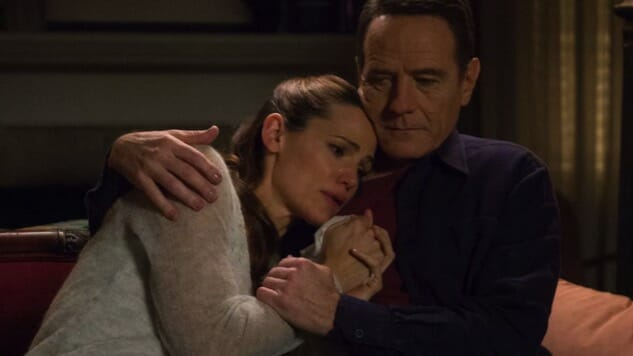Robin Swicord’s Wakefield is, simply put, a character study of a selfish asshole. That is not inherently meant as a slam against the movie. Cinema is rife with works that examine the inner lives of unsavory people; they’re often a lot more interesting to observe than normal ones, to be honest. But the best such films usually have some kind of darkly revelatory human insight to impart to its viewers amid the confrontational unpleasantness, something that resonates deep within a part of oneself that one may not have realized was there in the first place. That’s the kind of tapping into forbidden desire that is the lifeblood of great art.
By that standard, Wakefield is… well, let’s just say, its insights into human nature are limited, at best. The E.L. Doctorow short stor on which the film is based was told entirely from the perspective of Howard Wakefield, a middle-class man who suddenly decides to take a vacation from his own soul-killing life by taking refuge in his garage attic for an extended period of time, spying on his wife and two daughters from across the street. He’s yet another specimen of an ordinary individual driven mad by suburban ennui, but instead of eliciting sympathy for him, Doctorow makes him a privileged, self-delusional macho prig, as responsible for his own current unhappiness as any set of social norms. His choice to tell this story wholly through Howard’s own first-person narration, however, meant that it was up to us readers to make such judgments of his character on our own; only its concluding punchline of an ending suggests that we’re meant to see it all as acidic black comedy.
In bringing Doctorow’s short story to the screen, Swicord remains faithful to this deliberately circumscribed viewpoint—to a fault. To her credit, Swicord, who wrote and directed the film, isn’t entirely beholden to Howard Wakefield’s (Bryan Cranston) perspective. Though the film is dominated by Howard’s voiceover narration—full of direct-address self-justifications to the viewer, beckoning us to see the events through his eyes—isolated moments abound where she’ll use an image to contradict something Howard says; an ironic cut to him spying on his (glorified trophy) wife, Diana (Jennifer Garner), after he complains about how he feels constantly under surveillance from her; flashback sequences that feature images that Howard could not possibly have witnessed. It’s that play with point-of-view that gives Wakefield whatever mild cinematic interest it has. From his garage-attic perch, Howard is free to gleefully supply his own dialogue and characterizations to the people he spies on, similar in some ways to L.B. Jefferies’ behavior with all the residents around him in Rear Window; we have to remember in the back of our minds that we’re seeing interactions filtered through his own headspace, but it’s one informed by more inside knowledge than certainly we in the audience have.
But neither Swicord’s best efforts to lend some subtle perspective to Howard’s unreliable narration, nor Cranston’s entertaining hamminess in the lead role, are enough to justify the time spent with this sniveling character. It’s bad enough that Howard Wakefield is already basically a walking cliche of a self-pitying suburban patriarch from the start, tormented (so he believes) by his wife and ignored by his daughters. But by sticking so steadfastly to this one character’s mindset—and thus denying us not only other characters’ points of view, but also the kind of fuller backstory and social context that might have deepened our understanding of his psychology—Wakefield leaves us with little else to do, beyond marveling at his monstrous solipsism. Surely, there are more illuminating ways to spend two precious hours of your time.
Director: Robin Swicord
Writer: Robin Swicord
Starring: Bryan Cranston, Jennifer Garner, Beverly D’Angelo, Jason O’Mara, Ian Anthony Dale, Pippa Bennett-Warner
Release Date: May 20, 2017
Kenji Fujishima is a freelance film critic, contributing to Slant Magazine, Brooklyn Magazine, The Playlist and the Village Voice. He is also Deputy Editor of Movie Mezzanine. When he’s not watching movies and writing and editing film criticism, he’s trying to absorb as much music, art, and literature as possible. He has not infrequently been called a “culture vulture” for that reason.
